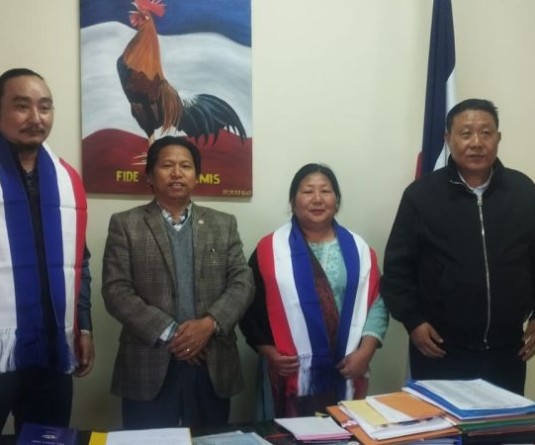
Chizokho Vero
Kohima | September 21
Minister for Planning and Coordination T.R. Zeliang, who is also chairman of Cabinet Sub Committee on Petroleum and Natural Gas today laid before the House a final report of the Cabinet Sub Committee on Petroleum and Natural Gas as well as draft Nagaland Petroleum & Natural Gas Regulations, 2012, which was later moved by Chief Minister Neiphiu Rio that the House approves the Nagaland Petroleum and Natural Gas Regulation, 2012. NLA Speaker Kiyanilie Peseyie told the House today that, discussion if any on the related matter shall be taken up on September 22 prior to its adoption.
The final report tabled on the floor of the House stated that these regulations shall be called the Nagaland Petroleum and Natural Gas Regulations, 2012 which will be extended to the whole of Nagaland and shall come into force with immediate effect and shall be published in the official gazette of the state. It said that word “company” would mean all business organizations which are legally authorized to operate within the territory of India.
On owners of petroleum and natural gas, it said that whoever owns the land beneath which petroleum and natural gas resources lie, shall be the owner of such petroleum and natural gas resources, in whatever form these may lie underneath their land; and owners of such land and resources may be,- individual land owners who own oil or gas wells and/or land in a zone; village bodies that own wells and/or lands in zone; and the state government that owns wells and /or lands in a zone. It also stated that an individual owner of oil or gas well and/or lands in a zone shall be certified to be so, by the village council concerned.
It stated that no owner of land or oil or gas well in Nagaland, whether an individual or a village body or the state government, shall alienate land or such well in favour of a non-Naga or a company but may give consent to a non- Naga or a company to access land or oil or gas well for pre- production, production and post-production operations in a zone, which shall revert to the owner at the end of operations.
On petroleum and gas zones, the final report said that the state government shall earmark the boundaries of oil and gas bearing areas in the state into petroleum and natural gas zones, as far as possible district-wise, classify them into pre-production, production and post-production zones and name them appropriately as per procedures to be specified in Rules. A list of such petroleum and natural gas zones shall be published in the official gazette of the state. The state government shall have powers to redraw the boundaries of zones, as and when it is found necessary, so that each zone is exclusively for one kind of operations.
The report said the state government shall, as soon as may be after the notification of the petroleum and natural gas zones, commence the process of awarding the zones to suitable companies. The award of a zone for any category of operation to a company shall be a permit issued by the state government which shall be valid for an initial period of ten years from the date of issue of the permit, which may be renewed every ten years.
Besides the permit fees paid to the state government, for commencing and continuing production of petroleum or natural gas in a zone, the company concerned shall additionally pay to the state government not less than 16% of total value of production of petroleum or not less than 12% of value of production of the natural gas as ascertainable at the mouth of oil or gas well, as the case may be, which shall be distributed in the following manner: (a) not less than 2% both in the case of petroleum and natural gas collectively to the individual land owners who own oil or gas well in a zone; (b) not less than 3% in the case of petroleum or not less than 2% in the case of natural gas collectively to other individual land owners who do not own oil or gas wells in a zone; (C) not less than 3% in case of petroleum and not less than 2% in the case of natural gas to the District Development Board of that zone; (d) Not less than 8% in the case of petroleum and not less than 6% in the case of natural gas to the state government.
It also stated that no part of crude oil or natural gas extracted from Nagaland shall be transported out of the state without being refined or bottled or converted into marketable products and by-products within Nagaland as part of post production operations subject to the production limits required for setting of such refinery, bottling and ancillary industries is reached by the companies.
The company operating under these rules shall name all petroleum and natural gas products and by- products by prefixing to the name of every such product or by-product the brand name “NAGA”, failing which it shall be deemed as violation of these regulations by the company.
On employment angle, it said, every company to which a permit is issued in respect of petroleum or natural gas zone, shall compulsorily reserve 33 % jobs of unskilled category and 10% of non-technical white collar jobs to Naga youths from the respective oil/gas bearing District in all (i) pre-production (ii) production and (iii) Post- production operations.
The state government shall establish a training institution by name “Naga Petroleum Academy” to train Naga youths in unskilled and skilled jobs, technical and non-technical jobs and other related work in petroleum and natural gas industry. The report said that the Nagaland Legislative Assembly has powers to “annul or modify any of these rules.”





